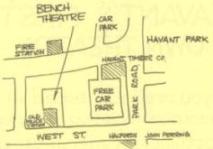Company History: Bench Theatre
February 1969: THEATRE UNION is formed by a group of drama enthusiasts with the aim of exploring plays through workshops. There is an adult group, a youth group and a school-age group, all meeting at the Havant Activities Centre.
The company started as a further education class in 1969 under the direction of Keith Milne. The first production, 'Six Characters in Search of an Author', was staged under the group's original name of Theatre Union.
May 1970: The adult group performs Pirandello's 'Six Characters in Search of an Author' at Havant Grammar School (which is now called Havant College). Three of the members, Tim Mahoney, Ray Osborne and David Spackman, form a triumvirate to lead the group after Keith moves north to further his educational career. Tim is the artistic director, David the producer and Ray the leading actor.

August 1970: The Havant Activities Centre faces demolition so Havant Borough Council leases the old Magistrates' Court in West Street to Theatre Union as its new permanent base. The Theatre Union group names the building THE BENCH THEATRE in reference to its former use. Theatre Union moves into the old magistrates' court and police station in West Street, Havant, which had become redundant when the new Civic centre site was being developed and the cells become dressing rooms!
December 1970: Though rehearsed at the Bench Theatre, the group's second production ('The Love of Four Colonels' by Peter Ustinov) is staged at the Leigh Park Community Centre.
June 1971: Arthur Miller's 'Death of a Salesman' is the first production staged at the new Bench Theatre.
The only space large enough for performances was the magistrates' court itself. The name, the Bench Theatre, came from the fact that the company were now performing in the space previously occupied by the magistrates' bench.
The space was tiny and could officially seat only 50-60 people. Tim was known to exceed this limit on several occasions as the company's reputation grew - he didn't believe in 'Full House' signs! There were three entrances into the room. One of these led to the back door and although a fire exit was also the location for the lighting and sound boards. The other two doors led to a little lobby or anteroom, which acted as the foyer (more than six people and it felt very crowded). The whole place was heated by a single black coal burning stove, reminiscent of a Chekhov play, which was located in the foyer. When the stove was lit, it was too hot for comfort in the foyer and when the metal expanded you could see the interior fire through parts of the stove not designed for that purpose.
The company performed a huge range of drama but perhaps made their reputation on performing the very best of contemporary drama. Enormous flexibility and ingenuity was used to stage the shows, and it was a proud boast that the audience never knew what the interior was going to be like or where they were going to be seated. One of the highlights had to be the recreation of a Georgian theatre for a production of Sheridan's 'The Critic', complete with naval gun battle!
The dividing line between audience and actors was always fragile. One of the Bench legends is of David Spackman finding himself in a blackout for the curtain call, tugging at the hand of a very reluctant fellow actor, only to discover when the lights went up, that the hand belonged to an embarrassed member of the audience.

July 1977: THE BENCH THEATRE COMPANY is invited by the HAVANT ARTS SOCIETY to make HAVANT ARTS CENTRE its new home. Refurbished from The Old Town Hall, the Arts Centre opens its doors in August 1977. The company plays a major part in establishing the new Arts Society, with founder member David Spackman becoming one of the first trustees of the society.
David Spackman was also responsible for overseeing the company's move into new premises in what became the Havant Arts Centre. Originally a carpet warehouse, it is an old Victorian building, which was the Town Hall before the Council moved to join the magistrates and the police in the new Civic Centre. The auditorium at the Havant Arts Centre, which still bears David's name, was the Council Debating Chamber - highly appropriate in the circumstances.
October 1977: After staging 29 plays as the Bench Theatre in West Street - and one other, 'Richard III', at Oaklands School - the company presents its last production at the West Street theatre; Peter Nichol's 'A Day in the Death of Joe Egg'.
December 1977: Alan Bennett's 'Habeas Corpus' is the Bench Theatre’s first production at Havant Arts Centre. David died of a heart attack on the eve of a dress rehearsal of his production of 'The Love of Four Colonels'. The company decided to proceed with the performances, a decision which would have met with David's approval, as his widow Sheila (a Bench Life Member) pointed out to a stricken cast. Tim and Ray were also to die within a short space of David's untimely departure.
The Bench has, however, continued to follow the principles of theatre and company as laid down by the original triumvirate. With almost all of them staged or premiered at the Arts Centre, since that first production the Bench has produced over 300 plays.